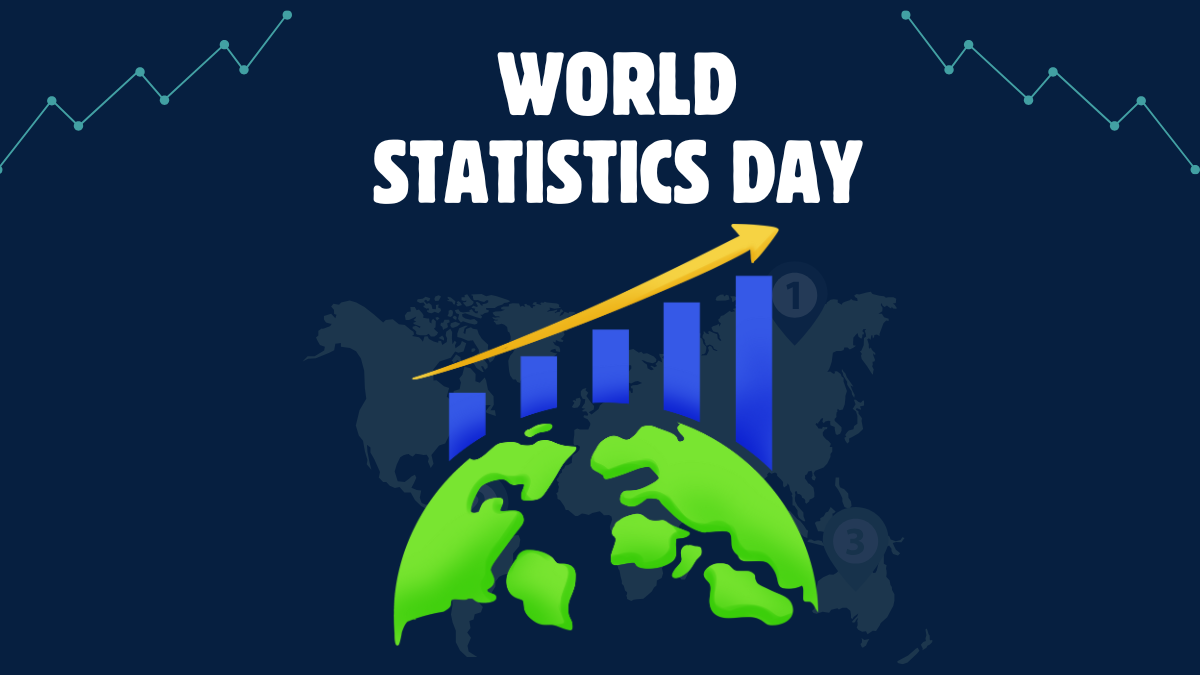World Statistics Day is an international celebration held every five years to highlight the significance of statistics in shaping societies, improving lives, and driving informed decision-making. In 2024, the global community will come together on October 20th to commemorate this special day. This celebration underscores the vital role statistics play in fostering sustainable development, promoting transparency, and empowering policymakers across the world.
History and Significance of World Statistics Day
The first World Statistics Day was celebrated on October 20, 2010, following a resolution adopted by the United Nations General Assembly. The aim was to raise awareness about the importance of reliable data and statistics in shaping global policies and contributing to the welfare of nations. The celebration occurs every five years, with the 2024 event marking the fourth such occasion.
Why Statistics Matter
Statistics are often referred to as the backbone of modern governance and economics. Accurate, timely, and relevant data is essential for monitoring socio-economic progress, implementing evidence-based policies, and achieving global development goals, including the United Nations Sustainable Development Goals (SDGs).
Without quality statistics, it becomes difficult to measure progress in key areas such as education, health, climate change, and economic growth. Governments, private sectors, and organizations rely on data to track trends, allocate resources effectively, and assess the impact of their programs.
World Statistics Day 2024 Theme
The theme for World Statistics Day 2024, is Use of Data for Decision Making.
Empowering Decision-Makers Through Data
In today’s fast-changing world, decisions need to be made based on reliable and up-to-date information. Statistics provide policymakers with crucial insights into societal trends, population demographics, and economic performance. This enables decision-makers to develop targeted policies that can improve the quality of life, particularly in vulnerable populations.
The 2024 theme highlights the need for data literacy, ensuring that governments, businesses, and even individuals are equipped to interpret and utilize statistics effectively for informed decision-making.
Contributions of International Organizations
International organizations like the United Nations (UN), World Bank, and OECD (Organisation for Economic Co-operation and Development) have consistently promoted the role of statistics in fostering global cooperation and sustainable development. The United Nations Statistical Commission (UNSC), established in 1947, plays a pivotal role in setting standards for data collection, processing, and dissemination globally.
World Statistics Day 2024 will also see participation from several statistical agencies around the world, conducting seminars, workshops, and conferences aimed at spreading knowledge on the power of data in transforming societies.
The Role of National Statistical Offices
National statistical offices (NSOs) are at the forefront of collecting and disseminating data. They ensure that statistical data aligns with international standards while addressing the unique economic, social, and geographic needs of their respective countries. On World Statistics Day 2024, NSOs from various nations will showcase how they have leveraged data to tackle national challenges such as food security, income inequality, and natural disasters.
Importance of Data in Achieving the SDGs
A key aspect of World Statistics Day 2024 is its focus on using data to achieve the Sustainable Development Goals (SDGs). These goals encompass a wide range of global challenges, including poverty eradication, climate action, and gender equality.
Measuring Progress Towards the SDGs
To effectively measure progress towards achieving the SDGs by 2030, reliable data and statistics are indispensable. For example, SDG 3, which focuses on good health and well-being, requires comprehensive health data to monitor infant mortality rates, life expectancy, and access to healthcare services. Similarly, SDG 13, which addresses climate action, relies on statistics related to greenhouse gas emissions, deforestation, and renewable energy consumption.
Without proper statistical tracking, it becomes nearly impossible to assess whether global targets are being met or to make course corrections where necessary.
Innovations in Data Collection and Analysis
The 2024 celebration will also shine a spotlight on the latest innovations in data collection and analysis, particularly in the era of big data and artificial intelligence (AI). Advanced technologies are enabling faster and more precise data collection methods, while AI is playing a growing role in analyzing vast datasets to derive actionable insights.
Some key advancements include:
- Satellite imagery for tracking environmental changes.
- Mobile technology for real-time data collection in remote areas.
- AI algorithms for analyzing complex data patterns and trends.
The Future of Statistics
As we look to the future, the role of statistics will only grow in importance. With the world facing unprecedented challenges such as climate change, pandemics, and economic inequality, there is a greater need for data-driven solutions. Investments in statistical capacity-building, particularly in developing countries, will be crucial in ensuring that no one is left behind in the march toward a more equitable and sustainable world.
Celebrations and Events on World Statistics Day 2024
To mark World Statistics Day 2024, events will be held globally to celebrate the importance of statistics and the people behind the data. These events will include:
- Webinars and panel discussions on the role of data in tackling global challenges.
- Workshops aimed at improving data literacy and raising awareness about the value of statistics in everyday life.
- Conferences that bring together statisticians, economists, policymakers, and data scientists to share best practices and innovations.
Governments, universities, and international organizations will participate in these celebrations, highlighting the achievements and challenges in using data to shape the future.




 Central Excise Day 2026: Why 24 February...
Central Excise Day 2026: Why 24 February...
 World Peace and Understanding Day 2026: ...
World Peace and Understanding Day 2026: ...
 International Mother Language Day 2026: ...
International Mother Language Day 2026: ...








